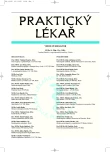Hypoglycaemia-associated autonomic failure, its clinical assessment and treatment.
Autonomní selhání způsobené recidivujícími hypoglykémiemi, jeho klinické hodnocení a terapie
Hypoglykémie je nejčastější komplikace inzulínové terapie u diabetiků. Těžká hypoglykémie může poškodit nejen mozek, ale i myokard a autonomní nervový systém. Časté epizody způsobují selhání odpovědi autonomního nervového systému na pokles hladiny glukózy v krvi a narušují její regulaci. Změny způsobené recidivujícími hypoglykémiemi prohlubují autonomní selhání a vedou ke stále častějším poklesům glykémie. Tento jev se nazývá HAAF (Hypoglycaemia-associated autonomic failure). Jeho patofyziologické mechanismy jsou již popsány, ale stále chybí klinické hodnocení. Exaktní kvantifikace frekvence a závažnosti hypoglykémií a míra narušení funkce autonomního nervového systému je důležitá pro volbu léčebného postupu. Proto byl vyvinut skórovací systém. Je prokázáno, že nejlepší terapií HAAF je transplantace Langerhansových ostrůvků nebo pankreatu. Funkční štěp zajistí dlouhodobou euglykémii nebo alespoň zmírní labilitu glykémií. Několik týdnů bez hypoglykémie je základní podmínkou terapie HAAF.
Klíčová slova:
Hypoglykémie, diabetes mellitus, autonomní nervový systém, transplantace
Authors:
M. Mindlová; F. Saudek
Authors‘ workplace:
Ředitel: MUDr. Štefan Vítko, CSc.
; Institut klinické a experimentální medicíny, Praha
; Přednosta: Doc. MUDr. František SAUDEK, DrSc.
; Klinika diabetologie, Praha
; Přednosta: prof. MUDr. Terezie Pelikánová, DrSc.
; Centrum diabetologie, Praha
Published in:
Prakt. Lék. 2007; 87(1): 52-57
Category:
Therapy
Overview
Hypoglycaemia is the most frequent complication of insulin therapy in diabetic patients. Severe hypoglycaemia may impair not only the brain, but also the heart and autonomic nervous system. Frequent episodes cause a failure of the autonomic nervous response to a falling blood glucose level and also impair its counter regulation. The changes caused by repetitive hypoglycaemia deepen the autonomic failure and lead to more and more frequent episodes. This phenomenon has been called „hypoglycaemia-associated autonomic failure (HAAF)”. Its pathophysiological mechanisms have been described but there is still a need for its clinical assessment. The exact evaluation of the frequency and seriousness of hypoglycaemia, as well as the autonomic nervous impairment, is essential for the selection of further treatment procedures. For this reason a scoring system has been developed. Transplantation of either the islet of Langerhans or pancreas has been proven to be the best treatment of HAAF. Afunctioning graft ensures long-term euglycaemia or at least improves unstable glycaemia. The fundamental prerequisite for HAAF treatment is several weeks without hypoglycaemia.
Key words:
hypoglycaemia, diabetes mellitus, autonomic nervous system, transplantation
Labels
General practitioner for children and adolescents General practitioner for adultsArticle was published in
General Practitioner

2007 Issue 1
- Advances in the Treatment of Myasthenia Gravis on the Horizon
- Hope Awakens with Early Diagnosis of Parkinson's Disease Based on Skin Odor
- Memantine in Dementia Therapy – Current Findings and Possible Future Applications
- Memantine Eases Daily Life for Patients and Caregivers
- Possibilities of Using Metamizole in the Treatment of Acute Primary Headaches
-
All articles in this issue
- Patent foramen ovale as a cause of paradoxical embolization in scuba divers. Screening possibilities, therapeutic and preventive recommendation.
- Hypoglycaemia-associated autonomic failure, its clinical assessment and treatment.
- Chronic renal failure in primary care
- Prescription of psychotropic drugs during pregnancy and breast-feeding in the general practitioner’s surgery.
- Wilson’s disease
- Diagnostics and treatment of rheumatoid arthritis – some new aspects
- Biochemical molecular mechanisms of heart failure (Part 2)
- Antimicrobial resistance in seven invasive bacterial species* monitored within EARSS in the Czech Republic (CR) from 2000 – 2006. (*Streptococcus pneumoniae, Staphylococcus aureus, Enterococcus faecalis, Enterococcus faecium, Escherichia coli, Klebsiella pneumoniae, Pseudomonas aeruginosa).
- Childhood injuries and their prevention
- Our experience with the treatment of acute mesenterial ischemia
- Craniopharyngioma in 79 years old man – a case study
- General Practitioner
- Journal archive
- Current issue
- About the journal
Most read in this issue
- Chronic renal failure in primary care
- Craniopharyngioma in 79 years old man – a case study
- Wilson’s disease
- Hypoglycaemia-associated autonomic failure, its clinical assessment and treatment.
